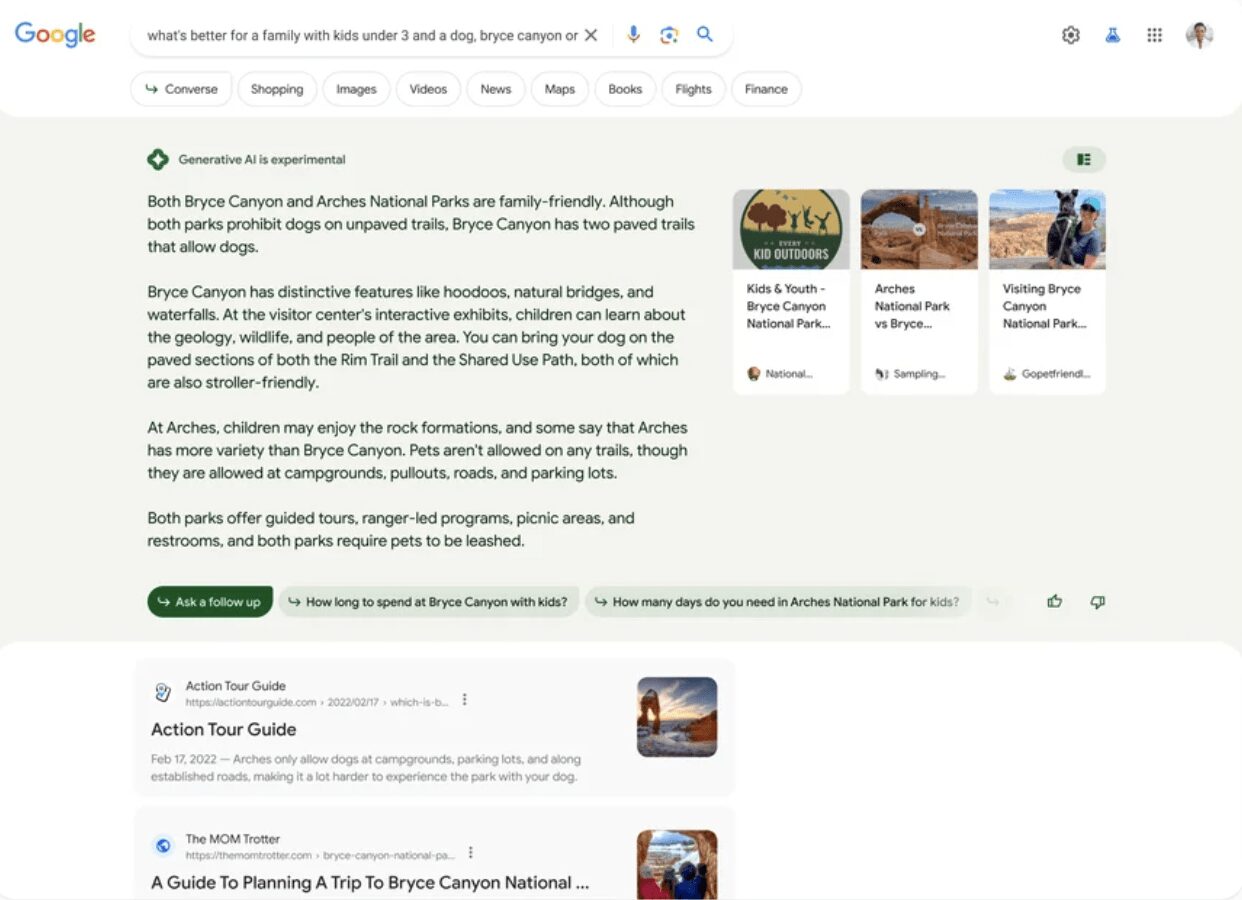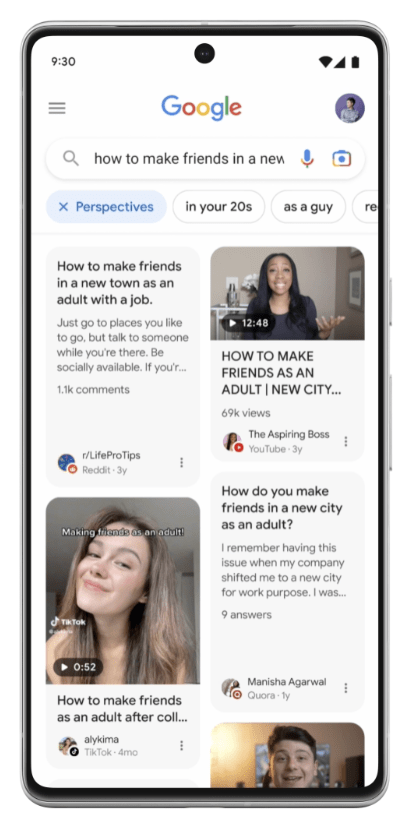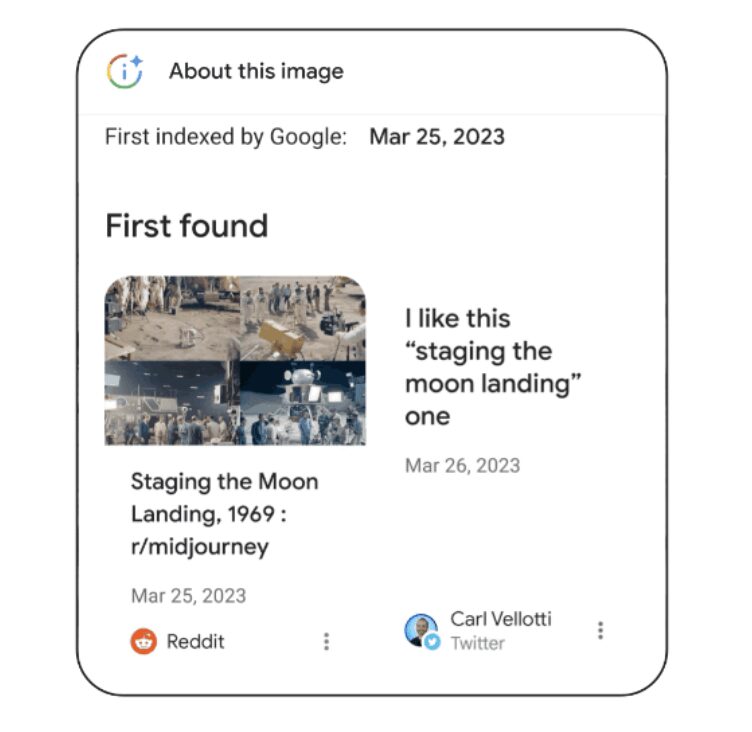We’ve all been waiting with bated breath for this year’s Google I/O conference, where the search giant usually reveals its most exciting leaps forward. This year felt especially important, because it comes in squarely in the middle of the current AI race.
And Google didn’t disappoint: they showcased some seriously game-changing features that will undoubtedly reshape the search experience and impact SEO strategies for brands of every stripe.
The biggest news coming out of the event was the introduction of the Search Generative Experience (SGE), which will allow users to ask longer, context-rich questions and receive comprehensive answers powered by AI directly on the search engine results page (SERP).
The announcement served as the latest iteration of Google’s response to Microsoft’s first-to-market advantage in launching the New Bing, which incorporates generative AI chat functionality into Microsoft’s own search engine.
So how will this paradigm shift in search affect your business and your search strategy?
Search Generative Experience: How Google’s new AI-powered features will change SEO
Google promises that they’re “reimagining what a search engine can do” with SGE by expanding the kinds of questions users can ask at the search bar. The initial AI-powered response will appear as a snapshot at the top of the SERP. Then users can engage with results in a conversational mode that takes the previous context into account so they can easily navigate follow-up questions and dig into the topic.
-
Source: Google
SGE is built to help users quickly gain a deeper understanding of topics and explore relevant source links for further insights. But SGE’s impact will vary across different search categories, and you should pay attention to when and where AI results show up.
If someone’s looking for medical or financial advice, for example, Google is going to surface fewer AI-generated responses. Those fall into what are called Your Money or Your Life (YMYL) questions. In that case, people aren’t looking for the quickest answer—they’re looking for the right answer and a “wrong” answer can open Google up to liabilities it could have otherwise avoided.
In some ways, this is a continuation of the multiple moves Google has already made toward zero-click searches. We anticipate a potential decline in both organic and paid clicks, as generative content occupies prime real estate above the fold and users will likely be able to get more information from a single search, right on the results page.
The presence and positioning of these AI snapshots on the SERP may also lead to a loss of Featured Snippets, since generative content will take precedence.
You’ll need to closely monitor these changes as they roll out and adjust optimization efforts accordingly to maintain visibility in search results. Your SEO teams and partners should be on the alert for patterns on the SERP so you can better understand what types of searches surface generative content.
As always, you shouldn’t look for any sketchy shortcuts to win at the SERP, old or new: the focus should be on creating compelling and informative content that entices users to keep exploring and look beyond the generated results in the snapshot.
Perspective Search: Combining influencer and creator content with AI capabilities
In 2022, Google launched the “helpful content update”, emphasizing a preference for content made for people by people versus content simply made for clicks. They’re taking things a step further by combining this approach with new AI capabilities under the new Perspective Search feature. Users will now be served content directly from creators and influencers by using the “perspective” tab in the search engine.
-
Source: Google
If you’re looking to connect with your audience, especially if you’re already leveraging more authentic, influencer or creator video content in your strategy on social channels and beyond, you’ll now be able to leverage that collaborative content and get it in front of your audience in a new and exciting way. Google is even looking to increase how often “hidden gem” content, like comments in a forum, posts on little-known blogs, or articles with niche expertise, appears in search results.
It’s all too easy to fall into a “business-as-usual” mindset about SEO, but smart SEOs know that Google is constantly improving and refining how it ranks content. You can’t just rest on your laurels, even if what you’re doing right now is working. If we learned anything from Google I/O, it’s further confirmation that continuous testing and experimentation are a critical part of your SEO approach.
Content AI Markup: Emphasizing transparency and diversifying content
As AI becomes more sophisticated and factors more heavily in the creative process, you’ll need to make it clear whether your visual assets were generated by AI or a human. Transparency around AI usage is increasingly important to users and essential to your credibility as a brand.
That’s why one of the biggest announcements from Google was a manual metadata markup indicating that the content was generated by AI. The AI-generated content will then display a label to users so people know how it was created.
Google will now include more details about all images it surfaces on its results page, including:
- When the image was first indexed
- Where it likely first appeared
- Where else it appears online (like on news, social, or fact-checking sites)
-
Source: Google
This slew of product and AI launches might feel exciting, but we don’t blame you if it all feels a bit daunting. The future of search is here, and a lot is changing. But if the basics behind what works and what doesn’t haven’t changed.
Continuous experimentation with SEO is one takeaway from Google I/O; the other is the continued importance of quality content. Google’s quality rater guidelines, better known as E-E-A-T (experience, expertise, authoritativeness, and trustworthiness), need to be front of mind across all of your organic and paid content efforts.
Those factors will play a critical role in your brand’s success at the SERP, so make sure you’re applying them across your written content, images, creator or influencer assets, and videos, whether they’re AI-generated or created by a person. They will play a major role in what appears in the SGE results, image results, or anything else you can find on the SERP.
You can get ready for the next stage of search by:
- Monitoring the roll-out of SGE and what kinds of queries are getting AI snapshot results so you can adapt your strategy based on how user behavior is changing
- Leaning into image, video, and creator/influencer content and making sure they’re optimized for the SERP features
- Making sure you’re prioritizing E-E-A-T in your content strategy
By embracing these new opportunities, you won’t just survive the dynamic SEO landscape—you’ll thrive.








